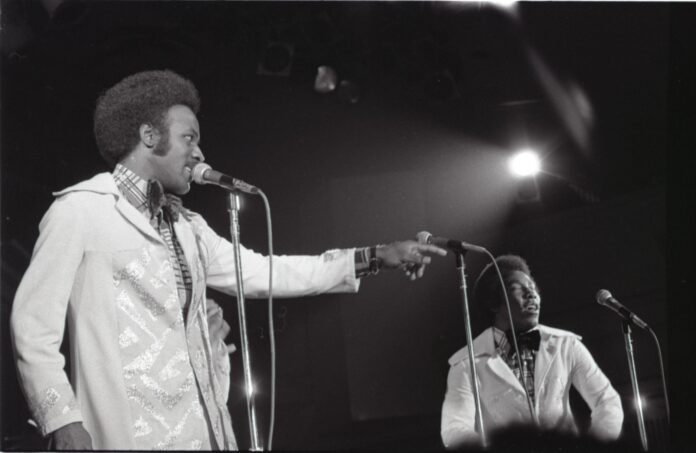Anyone writing a book, making a documentary, building a podcast on how 1971 was an influential year for music in America needs to survey the nascent days of Black-owned imprint Philadelphia International Records. Founded that year by Kenneth Gamble, Thom Bell, and Leon Huff, the label was destined to recast the late ’60s Civil Rights era into jazzy segues, polished blues, and talk-singing ballads (chiefly voiced by Teddy Pendergrass), presented in a silky-smooth new mode. Showcasing a beautiful and wholly lived-in sound during tumultuous and oppressive times for the Black community, “Philly Soul” proved a conquering pop formula, executed faultlessly by this Black-owned enterprise.
Even if life was rough, the music did not have to be.
Philly Soul was often considered a producer’s genre, since it was more a certain sound and vibe than an explicit set of musical directions, although gliding beats, impassioned voices, and those indelible horns ands strings were hallmarks. It was an algorithm that produced over 170 gold and platinum records for Philadelphia International. Unlike Berry Gordy’s Motown of Detroit, which achieved crossover success during the ’60s by branding itself “The Sound of Young America” and mostly steering away from overt political messaging, Philadelphia International built its reputation and cashed checks on delivering hope for a better day via song, while documenting the human condition in the present. Life, in its many forms, was the message embedded in that “Sound of Philadelphia.”
John Oates, co-founder of Hall and Oates, said the Black-owned label personified the candor and gravitas permeating throughout Philadelphia at the time. “All of a sudden, the Sound of Philadelphia is worldwide. No doubt about it. It was totally unique” he mentioned in Philly Mag earlier this year. “It didn’t sound like Motown or the R&B in New York or Chicago. It wasn’t the sound coming out of Memphis. Gamble and Huff, with the help of people like Tommy Bell, really created something new. It was a unique combo of African American music and English classical influence. The string arrangements. The orchestra touches. And really, the sound is a reflection of the city itself. They somehow captured what the streets of Philadelphia sounded like. I hear ‘Back Stabbers’ and I hear Philadelphia.”
A new box set, celebrating the 50-year Anniversary of Philadelphia International Records, contains the first eight studio albums released by the label from 1971-1973 on remastered CDs, plus a bonus 12-inch single. It comes housed in a sheeny 48-page slip-cased hardcover book, with photographs, liner notes by Tony Cummings (Author of The Sound of Philadelphia), and a foreword by Ralph Tee. Get on Board the Soul Train: The Sound of Philadelphia International Records Volume 1 from United Should Records covers the backbone, funk, and grandeur of Philly Soul just before its mid 1970s peak. The rest of the PIR albums are scheduled for a future release.
The first eight albums collected here include three by Billy Paul (Going East, 360 Degrees of Billy Paul, Ebony Woman), and one each by Harold Melvin & the Blue Notes (I Miss You), the O’Jays (Back Stabbers), Dick Jensen (Dick Jensen), the Intruders (Save the Children), and MFSB (MFSB).
This arrangement, an amalgam of gospel, doo-wop, and soul music of the time influenced everyone.
David Bowie created ‘plastic soul’ in 1974 from the Philly Soul sound. The house band for the label MFSB (Mother Father Sister Brother) created one of the first songs to be sampled heavily for hip-hop and breakdancing, while others refer to it as proto-house: “Love Is The Message” was postmodern at the time of its release, predicting the backbone of modern dance music, 20 years in advance. From telling very distinctive and poignant stories, with songs like Billy Paul’s “Me and Mrs Jones” and his funky organ statement “Am I Black Enough For Ya,” the upstart label, at the jump, always aimed its frequency at community. Philadelphia became the nexus of a global response.
Help us save local journalism!
Every tax-deductible donation helps us grow to cover the issues that mean the most to our community. Become a 48 Hills Hero and support the only daily progressive news source in the Bay Area.
Billy Paul’s three-album contribution outlines the trajectory this Black jazz vocalist as he maneuvered in the early ’70s. Before that crossover smash hit “Me and Mrs Jones,” he performed pop hits like Steppenwolf’s “Magic Carpet Ride” and a ringing rendition of The Associations “Windy,” alongside the jazz classic “Compared To What” and Elton John’s “Your Song.”
Harold Melvin and The Blue Notes featuring Teddy Pendergrass, a drummer before getting on the mic, hit wide acclaim for their ballads “If You Don’t Know Me By Now” and “I Miss You.” But it’s the torrid social commentary, with Teddy addressing his lady, informing her she’s keeping the coat on while he speaks, on the preachy-good “Be For Real” that delivers community service at the slow dance.
Ultimately, it’s the O’Jays Back Stabbers that represents in one cohesive album the fine line of gain and loss we must negotiate in life. The opening lines “They smile in your face/all the time they wanna take your place” sets up the plasticity of how your fellow man would insert themselves into your position, within seconds, if situations presented themselves. As if to balance out the vibe, “Love Train” closes out the album with the optimistic message of unity. It’s a melody and strain that still rings loud in 2021, but serves notice to watch your back, while getting on board.





